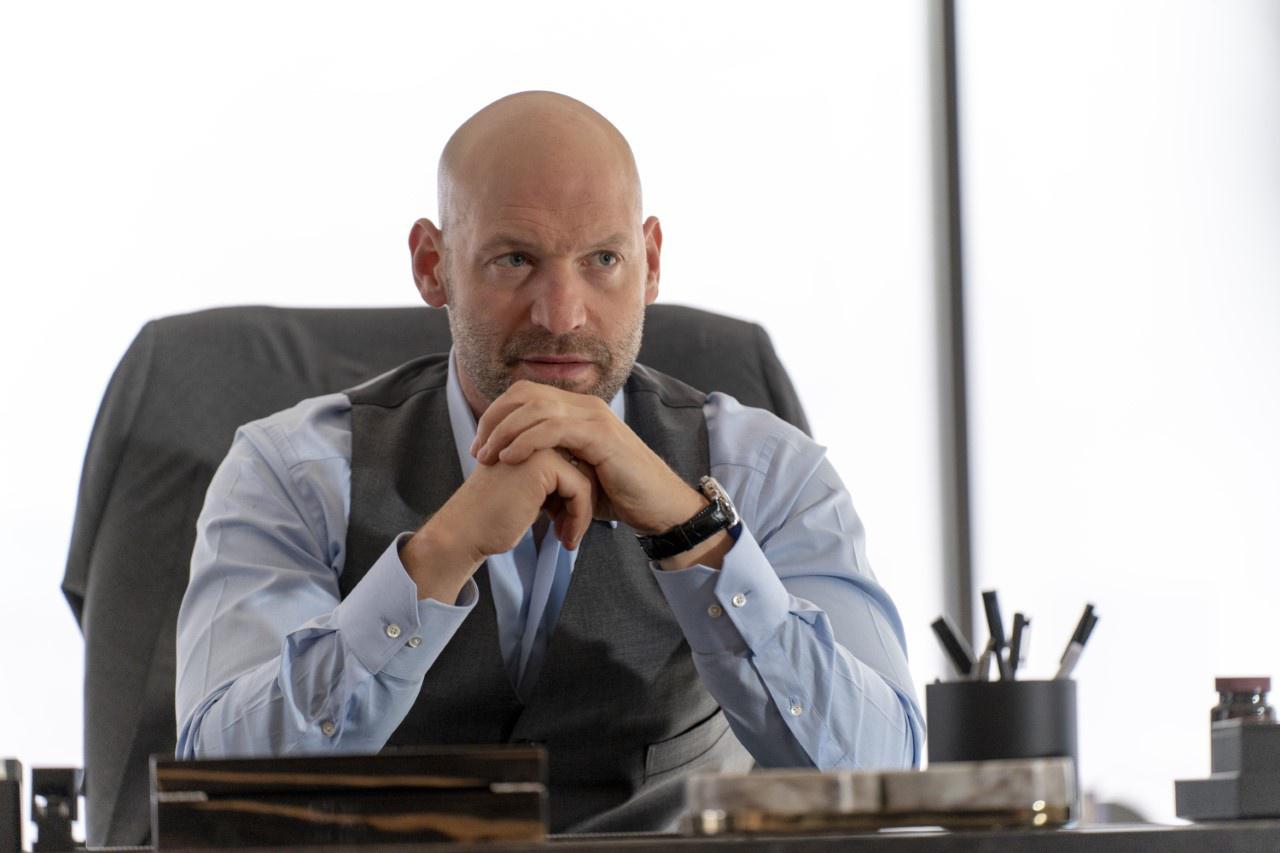
Ahead of Billions’ return on January 23, its co-creators dished to Forbes about the real-world inspirations behind their fictional billionaire characters.
Mike Prince, played by Corey Stroll, sitting at the desk formerly occupied by Bobby Axelrod.
Showtime’s hit TV show Billions returns for its sixth season on Sunday, but with a key change: Bobby Axelrod, the ruthless hedge fund billionaire played by Damian Lewis, bowed out at the end of season five as he fled to Switzerland to avoid prosecution. His replacement is the image-obsessed venture capitalist and business operator Mike Prince (played by Corey Stoll).
If Axelrod takes after hedge fund tycoons like Steve Cohen (who himself was banned from trading client money for two years), then Prince brings to mind the moral grandstanding of Silicon Valley tech billionaires like Elon Musk and Mark Zuckerberg. The character swap reflects not just a plot twist, but broader changes since the show’s 2016 debut: in the behavior and mindset of billionaires, and in the public’s growing captivation with the jet-setting class, according to Billions co-creators David Levien and Brian Koppelman in an interview with Forbes.
“We were initially focused on hedge fund billionaires who were press shy and didn’t want to be written up for being so rich,” says Levien. “We’ve seen a shift to a more public style of billionaire who wants to influence the public discourse. That’s where Mike Prince comes from.”
The two Billions showrunners–who first met as teenagers and co-wrote Hollywood hits like Rounders and Ocean’s Thirteen–understand the billionaire milieu better than most. Koppelman and Levien, along with fellow show creator (and CNBC/New York Times journalist) Andrew Ross Sorkin, began studying the world of billionaires in 2014 when they shot Billions’ pilot episode. Then, the ultra wealthy faced less public scrutiny than they do today. Memories of the 2008 financial crisis were fading as the economy rebounded. The Silicon Valley elite were celebrated as their companies grew (“election misinformation” was not yet a phrase). The idea of a certain brash billionaire real estate developer becoming president seemed far-fetched.
MORE FOR YOU
“We had started to see that billionaires in America were like nation states in their level of influence and power, and we felt like it was underreported in popular culture,” says Koppelman. “Characteristics like verbal acuity, charisma and confidence were starting to be held up as though they were qualities of character. We wanted to explore that.”
Billions co-creators Andrew Ross Sorkin, Brian Koppelman, and David Levien attend the Billions … [+]
To accurately portray billionaires, the showrunners embarked on a journey of “continuous research” into their subjects’ habits, routines and worldviews. The duo estimates they have interviewed 25 to 30 billionaires over Billions’ run, including the NBA’s Dallas Mavericks owner Mark Cuban–“a friend of the show”–and venture capitalist Chris Sacca, both of whom have made cameo appearances (Cuban on five occasions). The co-creators declined to reveal their other billionaire muses, but a number of other tycoons have appeared on the show, including Spanx founder Sara Blakely and New York Giants chairman Steven Tisch.
When the show’s writers need to depict complex market mechanics, they consult their technical advisor Josh Brown, CEO of advisory firm Ritholtz Wealth Management, which manages $1.8 billion in assets. Brown helps the show’s writers create plausible scenarios, feeds them financial lingo and keeps them abreast of Wall Street developments–like the rise of crypto, which becomes a subplot in season five when Axelrod’s teenage son gets in trouble for mining Bitcoin at his prep school.
“We don’t want people in finance or Wall Street to say, this could never happen,” says Brown. “We walk the line between being creative and entertaining, and then grounding as much of that in reality as possible.”
For the more arcane storylines, Brown connects the show’s writers with subject matter experts. For example, when Axelrod’s character decides to buy a bank in season five, Brown brought in a professional who specializes in institutional risk analysis for small banks. “Of course, that kind of thing would be rife with controversy,” says Brown, “but if you don’t even know the regular way to obtain a bank charter, it would be hard to be creative about how somebody like Bobby Axelrod would try to do that.”
To realistically capture billionaires’ day-to-day lives–from the meals cooked by their private chefs, to how they split time between homes–the showrunners have interviewed members of tycoons’ personal staff, though they won’t say who or how many. The creators also spend time with billionaires in social settings whenever they can, including at fundraisers and galas hosted in their lavish homes. They have even competed with billionaires in sporting events–which are as competitive as you might imagine.
“One of the things we just learned immediately was that these guys basically wanted to win in every interaction–that nothing was casual,” says Levien. “There’s always a ‘How am I going to get the best of the situation in every moment to moment interaction?’ That was fascinating to us.”
A memorable example: Levien attended a 2019 charity poker event in New York City whose attendees included a who’s who of hedge fund investing: Avenue Capital Management’s Marc Lasry (estimated net worth: $1.8 billion), Greenlight Capital’s David Einhorn (estimated net worth: $1.4 billion) and Saba Capital’s Boaz Weinstein (not a billionaire, but a recognized chess expert).
“Watching the way people like that compete, even at a charity poker tournament, gave us a lot of information to then think about and write about,” says Levien. Not that high-stakes poker games were new fodder for the Billions writers–they had already immortalized Wall Street’s charity poker circuit in the season two episode ‘Optimal Play,’ in which Axelrod and his brilliant deputy Taylor Mason (played by Asia Kate Dillon) square off against rival investment tycoons in the fictional Alpha Cup Charity Poker Tournament.
Despite their real-world research and inspiration, Billions’ creators insist their billionaire characters are just that: made-up characters. “They are composites of many people and the characteristics they embody, put into fictional vehicles,” says Levien.
Still, viewers can be forgiven for not always buying that party line. The showrunners deny previous reports that Billions’ central rivalry–between Axelrod and the combative U.S. attorney Chuck Rhoades, played by Paul Giamatti–is modeled after the legal skirmish between hedge fund billionaire Steve Cohen (net worth: $15.9 billion) and Preet Bharara, the former U.S. Attorney for the Southern District of New York who in 2013 successfully prosecuted Cohen’s SAC Capital for insider trading. But it is true that the showrunners interviewed Bharara after the pilot to better acquaint themselves with the responsibilities of Giamatti’s character.
As Billions enters its post-Bobby Axelrod era in season six, its creators say they will remain focused on portraying billionaires truthfully–the good, the bad and the ugly. Says Levien: “Our show is always concerned with the way people mythologize themselves, the way that humans take in that myth and then the truth underneath.”






